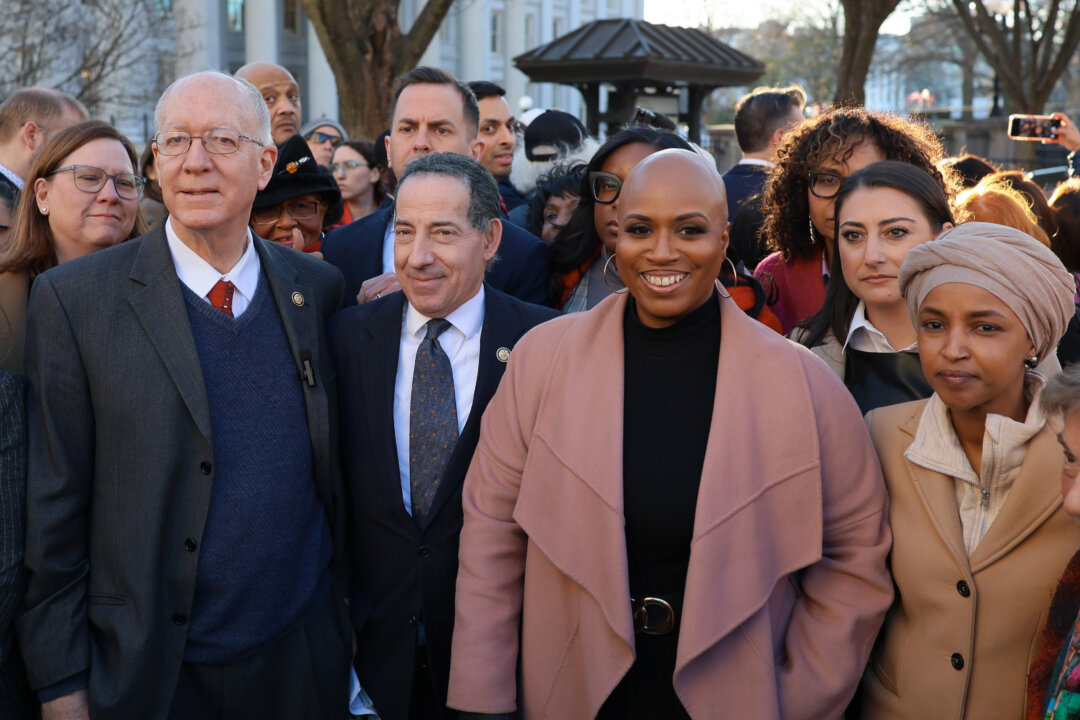Senate Minority Leader Chuck Schumer and others rallied with lawmakers as speakers floated strategies to stop Trump.
WASHINGTON—Congressional Democrats tried to gain entry to the Treasury Building, saying they wanted to provide oversight after the Department of Government Efficiency (DOGE) gained access to the Treasury’s federal payments system.
Senate Minority Leader Chuck Schumer (D-N.Y.), Sen. Elizabeth Warren (D-Mass.), and other top Democrats spoke at a rally after the would-be oversight squad, led by Rep. Maxwell Frost (D-Fla.) and Rep. Seth Magaziner (D-R.I.), attempted to gain access to the building’s grounds at a gate. The Secret Service rebuffed them.
The Feb. 4 incident, which came amid reassurances from the Treasury Department to lawmakers that staffers have “read-only access,” looked a lot like a similar rally outside the foreign aid agency USAID by Democrats on Feb. 3. Secretary of State Marco Rubio has told lawmakers the agency will be subject to reorganization, and its website has been shut down.
Reps. Ayanna Pressley (D-Mass.), Jamie Raskin (D-Md.), and Ilhan Omar (D-Minn.) were among the high-profile Democrats clustered in a knot of media, staffers, and other protesters near the gate.
Pressley told The Epoch Times that DOGE’s access to payment data was “a power grab by a dangerous man who was not elected by anyone,” referring to DOGE leader Elon Musk.
“We will see him in the courts and in the streets,” she said of President Donald J. Trump.
Rep. Sara Jacobs (D-Calif.) denied that the attempted entry was a form of direct action, telling The Epoch Time she and her colleagues were “hoping to do [their] constitutionally mandated job of oversight to see why Elon Musk has access to these very sensitive, critical information systems.”
Rep. Bill Foster (D-Ill.) voiced skepticism about the assertion from the Treasury that access was read-only.
“What we should be doing is going inside, talking to the IT professionals,” he said.
In speeches outside the building, congressional Democrats said DOGE’s access violated the law and questioned Musk’s alleged influence over the Trump administration.
In addition to leading DOGE, a time-limited commission within the Executive Office of the President aimed at cutting waste and making government more efficient, Musk was a critical fundraiser and campaigner for Trump in the final stretch of the 2024 presidential election.
The rally, which grew as lawmakers spoke, was organized by the progressive groups MoveOn and Indivisible, and by the Working Families Party, a minor progressive-left political party.
One sign called to “arrest Musk.” At one point, a protester called for Musk’s deportation. An inflatable Trump, marked with a swastika, worked its way through the surging crowd.
Rep. Maxine Waters (D-Calif.) questioned Musk’s aspirations to reach Mars. Musk’s company SpaceX, which has developed successful reusable rockets, has been a frequent recipient of government contracts. The Pentagon is also increasingly reliant on SpaceX and Musk’s Starlink Internet service.
“Oh, you want to use our money to go to Mars? No, we’re going to use our money right here, in Washington, D.C.” and in the wider United States, Waters said.
Speeches lingered on strategies to oppose Trump and Musk. On Feb. 3, federal employee unions sued Treasurer Scott Bessent over DOGE’s payment system access.
Legislative leverage remains a challenge for Democrats as they face Republican majorities in the House and Senate and, on some nominations, defectors.
Soon after the rally, the Senate confirmed Pam Bondi as attorney general in a 54 to 46 vote. Sen. John Fetterman (D-Pa.) joined his colleagues across the aisle to support Bondi.
Schumer announced that all Democrats in the Senate would vote against Russ Vought, Trump’s nominee to lead the Office of Management and Budget. Vought held the same position in the last Trump administration.
The final speaker, Indivisible’s Ezra Levin, demanded that Schumer, by that point absent, “do something,” urging the crowd to demand that their senators oppose the president’s nominees.
“We need to withhold unanimous consent,” Levin added, referring to a procedural tool that would force individual votes on every nominee—a tactic for delaying the approval process. Senators can use the lengthier cloture process to confirm nominees when unanimous consent is withheld.
Out of 1,300 administration roles requiring Senate confirmation, Trump has nominees for 144, with 96 in consideration by the Senate and nine fully confirmed, according to the Partnership for Public Service.
Foster told The Epoch Times that he hopes more leaders in the business community will react against Musk’s involvement in federal affairs. Musk has been named a special government employee by the White House and remains active in the private sector.
Trump told reporters on Feb. 3 while signing executive orders in the Oval Office, “Where we think there’s a conflict or there’s a problem, we won’t let him go near it,” referring to concerns about Musk’s conflict of interests while leading DOGE.
“They were always proud of the fact that in the United States of America, either you’re in business or you’re in government, and there’s a clean separation,” Foster said of the choices of past American business leaders.


 简体中文
简体中文 繁體中文
繁體中文 English
English 日本語
日本語 ไทย
ไทย Tiếng Việt
Tiếng Việt